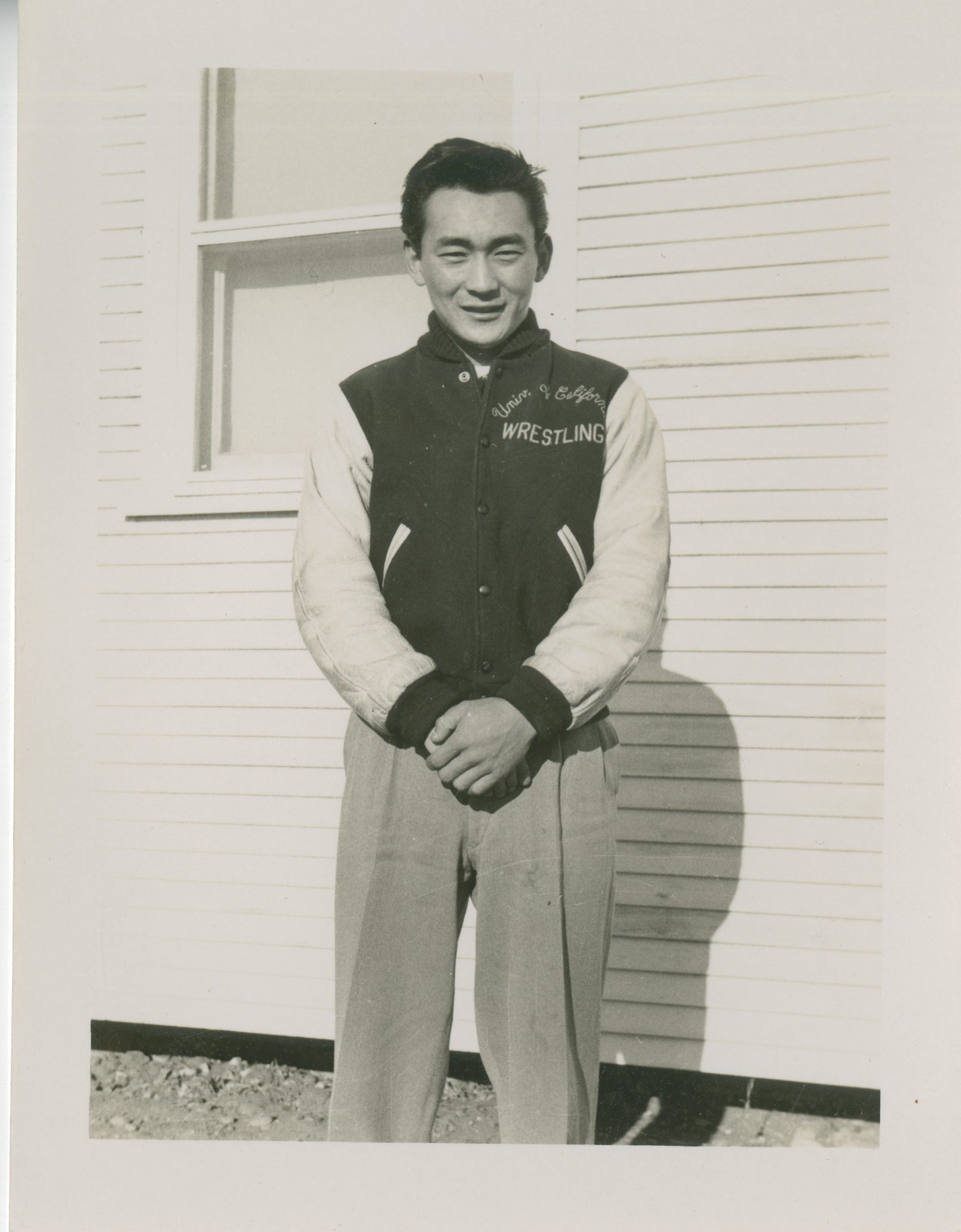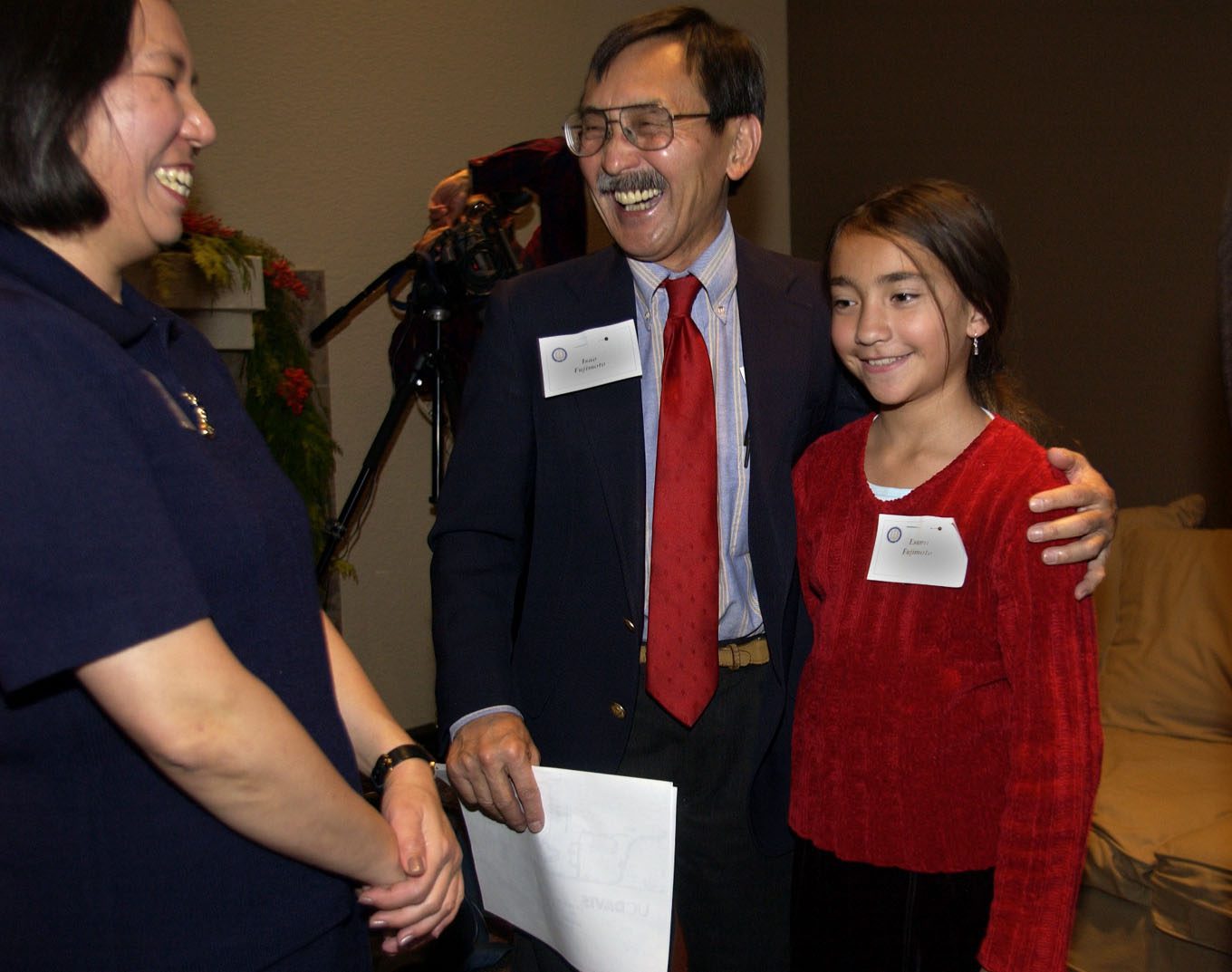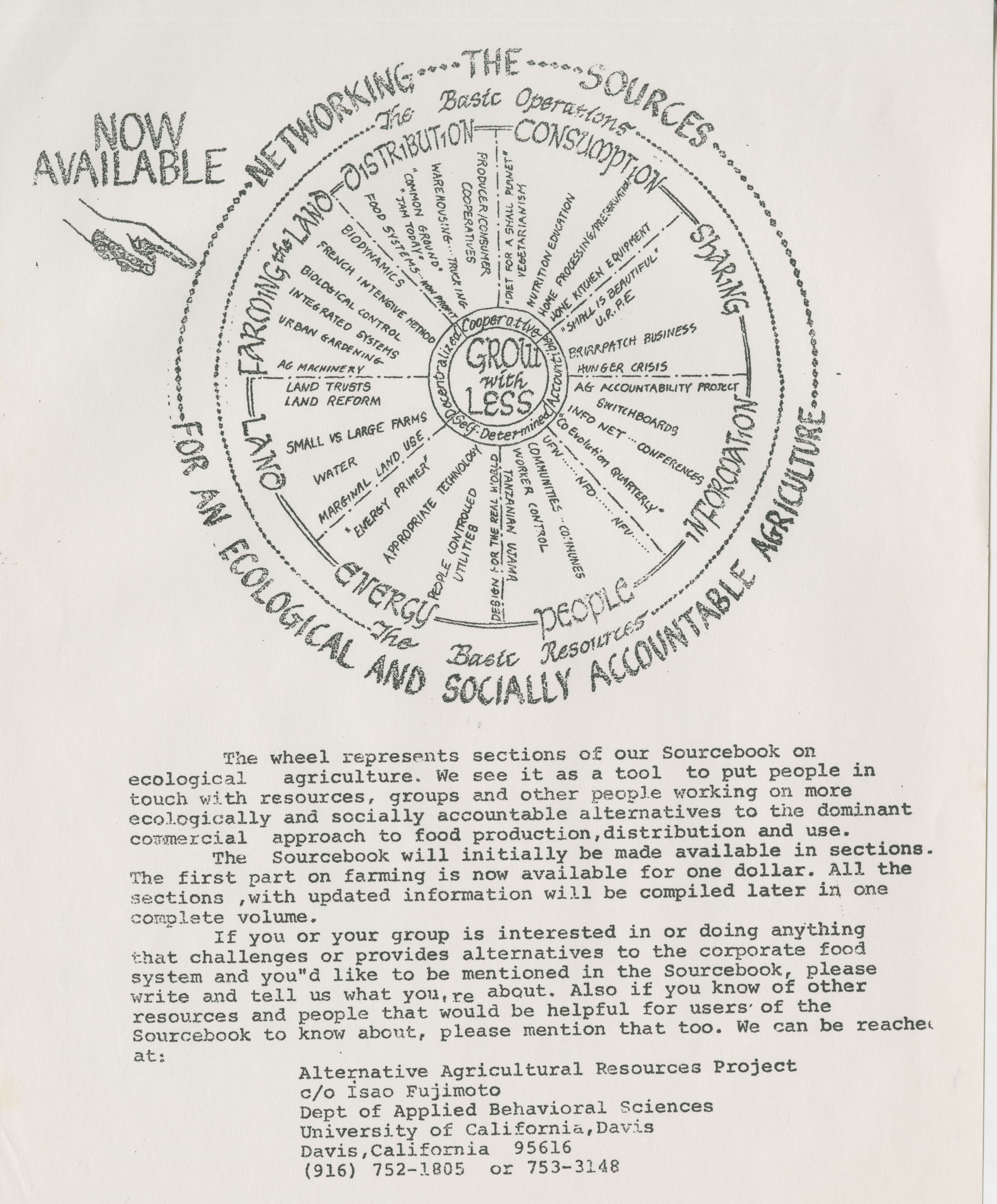Isao Fujimoto circa 2003. (Box 14: Folder 77, Tansey W. Thomas Papers, D-628, Archives and Special Collections, UC Davis Library.)
Isao Fujimoto: Food, Justice, and Resilience
Dr. Isao Fujimoto (1933-2022), senior lecturer emeritus at UC Davis, passed away on February 25, leaving an undeniable influence on the generations of students and colleagues he touched as an educator and activist. Through decades of work, he left his mark on various subjects including community empowerment, rural revitalization, community solidarity, sustainable agriculture, and green technology. Fujimoto was a graduate of the University of California, Berkeley (1955) and Stanford (1960), returning to Cornell to complete his Ph.D. after retirement in 2010. He joined UC Davis in 1967 and taught for many years as senior lecturer emeritus of Asian American Studies and the graduate program in Community Development, programs he helped found.
The UC Davis Library is honored to hold the Isao Fujimoto Papers (D-601) in Archives and Special Collections, where it serves as a flagship collection in our emerging focus on the Northern California Food Movement. The library is currently preparing Dr. Fujimoto’s collection for selective digitization so that his materials can continue to reach a wider audience online. Once digitized, these items will be available at digital.ucdavis.edu.
Building the Foundations
Isao Fujimoto grew up on the Yakima Indian Reservation in Wapato, Washington during a time when the Alien Land Law forbade immigrants from leasing or owning land. These laws limited the housing options available to Asian Americans. Later, during the outbreak of World War II, he was an inmate of the Heart Mountain, Wyoming and Tule Lake, California “concentration camps,” in his words.

When the war was over, Fujimoto and his family relocated. He was the eldest of 13 siblings in a family that farmed strawberries in the Santa Clara Valley for 20 years. From 1956-1958, he was a United States Army correspondent in Korea during the Cold War.
In a 2003 interview for the Veterans History project, Fujimoto reflected on his experiences and how they influenced his work as a community organizer:
The kind of work I do has to do with social justice. So the whole experience is reflecting on the experience of the Japanese American community, which dealt with a lot of discrimination issues. It raises a lot of questions like how does this come about and how do you solve it? You can’t just sit back to get people together. There are strategies…to work together and cooperate. It’s not easy [because] people have different opinions. Some people don’t like each other. You try different ways to get people together.

Fujimoto worked with marginalized, multi-ethnic immigrant communities in California’s Central Valley for 50 years. He was involved with groups like the Rural Development Leadership Network, American Friends Service Committee, and other grassroots activists in the U.S. and Japan. He also served on the boards of groups like Global Exchange, Food First, The Data Center, California Institute for Rural Studies, Rural America, etc.
When asked to describe the work he did, Fujimoto commented that he “… worked with a lot of issues related to how people can work together to improve the community. So I worked with a lot of minority groups. I worked with small towns and with different international situations. You focus on work on how immigrants; minority people really become active participants in their community.”
As an educator, Fujimoto taught chemistry and English at San Jose High School in San Jose, California prior to joining the faculty of UC Davis in 1967. At UC Davis, Fujimoto helped found the Community Development program and later, the Asian American Studies Program (one of the first programs of its kind in the country). He taught a variety of classes in both departments, including a class with the UC Davis Summer Abroad Program, “Community and Everyday Life in Japan,” where students met with community activists in the Kyoto-Osaka area in Japan.
Fujimoto retired in 1994 but remained active as an educator well into his retirement, often teaching classes and holding office hours on the UC Davis campus. He also remained active in the Davis community and other groups post-retirement.
Reframing Ideas About Food
As a Davis community member, with his students, Fujimoto helped start local institutions such as the Davis Food Co-op and the Farmers Market, both of which were originally run from his home. His former students claim that 11 student projects and organizations were run from his home, many of which were related to the Northern California Food Movement.
The Northern California Food Movement (1970s-1990s) encompasses Northern California and the Central Valley and the role these regions play in changing the national conversation about the food we eat, how it is produced, and the lives of the people who grow and sell it. Fujimoto was prominent in this movement as he encouraged his students to participate and engage in the changing conversations surrounding food.
Fujimoto believed that research and development in agriculture were “… not just about land and production, it’s about community and … respecting the people and environmental resources that make production possible. That was our whole approach from the beginning. [However] I had a rough time on campus because I didn’t get much support, so I started doing things at home.” One such project was the Alternative Agricultural Resources Project, which emphasized the benefits of growers at the forefront of agricultural research.

It was in this environment that Ann Evans, 1975 UC Davis alumna and co-founder of the Davis Food Co-Op and Farmers Market, and others fostered ideas that would help change the relationship Davis had with food. Evans said:
We were dedicated to creating a new vision of a local food system. It wasn’t just a food co-op… In our minds we were working on changing the world … and Isao really had an environmental influence on this region because a lot of people who studied with him became pioneering California organic farmers.
Today, UC Davis is a global leader in agricultural science, food systems, and sustainability. Isao Fujimoto was one of many professors who helped fundamentally change the research done in agriculture and the related interdisciplinary fields. His ability to connect with students and people helped him foster the spirit of change for generations to come.
Archives and Special Collections stewards the Fujimoto, Isao papers (D-601), which include correspondence, personal journals, and publications related to farmworker and immigrant rights. The papers also include other material related to the development of the Northern California Food Movement, green technology, and community/rural development. A more detailed finding aid can be found on the Online Archive of California, but many of his papers are still unprocessed, and ongoing work is in progress for this collection. You can support this work via the Library Archival Processing Fund.
Other works available in Archives and Special Collections or Shields Library that detail Fujimoto’s work include his memoir Bouncing back: community, resilience & curiosity and a new book on food activism In the struggle: scholars and the fight against industrial agribusiness in California. You can also view the Story Map for Bouncing Back.